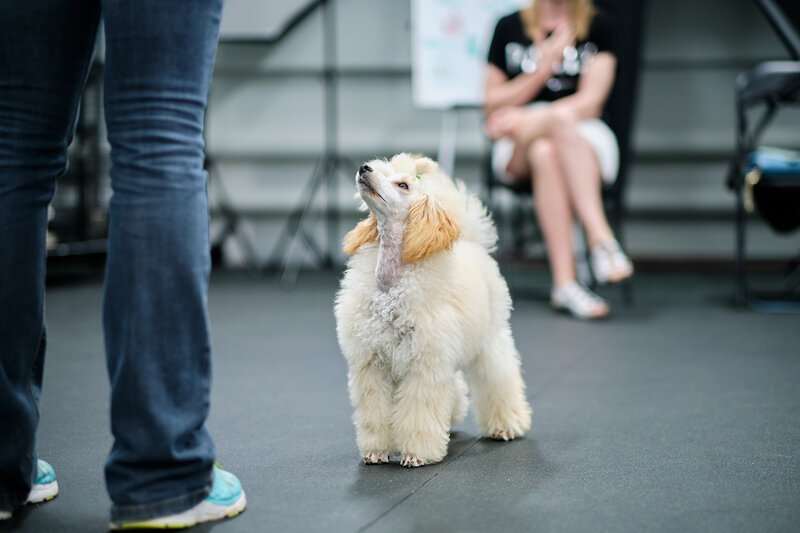
Working with a dog trainer is a wise investment, improving the quality of life for humans and their dogs. The sooner you learn the correct way to work with a puppy or new dog, the faster they will learn basic commands and understand the behavioral expectations in your household.
Finding the right dog trainer may take a little research. As you look for dog trainers in your area, verify their credentials, speak to recent client references, and feel them out to ensure it’s a comfortable fit.
As you begin your online or word-of-mouth search for choosing a dog trainer, ask these five questions and compare their answers.
Ultimately, the best dog trainer for you is the one that balances experience and qualifications while also making you feel comfortable. If you feel anxious, nervous, or on edge with the trainer, your dog will pick up on that, making it harder to work well together.
We all have to start somewhere, and there are gifted young trainers out there. However, as with any talent or calling, experience matters. Verify an advertised dog trainer's credentials and learn more about their experience or niche.
Some of the credentials to look for include:
You wouldn’t send your child to a school with teachers who haven’t completed a teaching credential or visit a therapist without proof of their education, experience, and training. The same should hold for dog trainers.
Also, are they dedicated to continuing their education and training? Ask what courses, conferences, or training/certification programs they’ve attended in the past few years. Trainers with 20+ years of experience may not be taking classes, but odds are they’re attending events and informational gatherings to remain abreast of our industry’s evolutions and emerging practices.
Finally, always ask to speak to recent references to learn more about others’ experiences with your prospective trainers. Ideally, you want to talk to people who sought support with the same things you are - be it learning basic commands and socialization strategies to show dog training or extreme behavioral support.
Some trainers only offer one-on-one or home visits. Others have a variety of different offerings, from one-on-one home visits and group dog training classes to full-fledged doggy boot camps.
We recommend selecting a trainer who offers a range of options because you never know what you and your dog may need down the road - or what a future dog may bring to the mix. In addition, establishing a long-term relationship with a trainer you like and trust is worthwhile if you are a lifetime dog lover.
Dogs are wired to please their in-charge (alpha/beta) pack members and work cooperatively in a group. Intense negative correction, or an imbalance of negative correction to positive reward/encouragement, results in an anxious, confused, and unhappy pooch.
Positive feedback or reward-based dog training doesn’t mean “treat training” (although we do use treats at times). Instead, this method is devoted to rewarding dogs with positive attention, verbalizations, body language, and lots of love and encouragement when doing what we want. The other side of that coin is that we don’t shame, harshly punish, or physically harm a dog for doing something we don’t want.
For example, when potty training a puppy or new dog, we act like they just won the lottery every time they pee or poop in their established potty place. If you catch them in the act, a firm “no” is fine as you physically remove them to try again in the established potty place. However, you don’t swat at the dog. Nor do we punish dogs when we find an accident that already happened - as they don’t make that connection the same way.
Intentionally seek trainers who are warm, loving, and firm with dogs - but who are dedicated to positive feedback and reward-based training techniques.
Dog training is a two-way street. Cohabiting with dogs is a relational experience, and both creatures must have a deep understanding of one another. While dogs are straightforward in their communication, humans can be erratic, inconsistent, and confusing. You’re looking for a dog trainer who works closely with you and your dog, aiming to facilitate deep bonds between the two of you.
If your dog falls into a particular niche (working dogs, aggressive dogs, destructive or unwanted behaviors, etc.), look for a trainer with substantial experience and success in that arena.
Are you interested in learning more about show dog life? What about agility training? Finding and interviewing dog trainers specializing in the types of training or behavioral intervention relevant to your dog increases the odds of choosing the best dog trainer the first time around.
Are you searching for a “dog trainer near me”? Contact Alternative Canine Training. (734) 462-2810. We believe the right trainer/client fit is essential and are happy to refer you to other qualified dog trainers in the area if necessary.